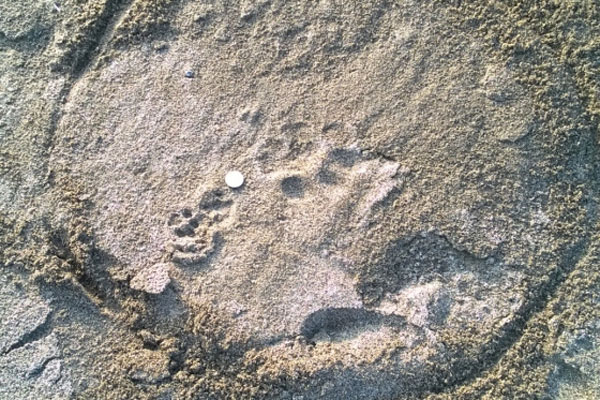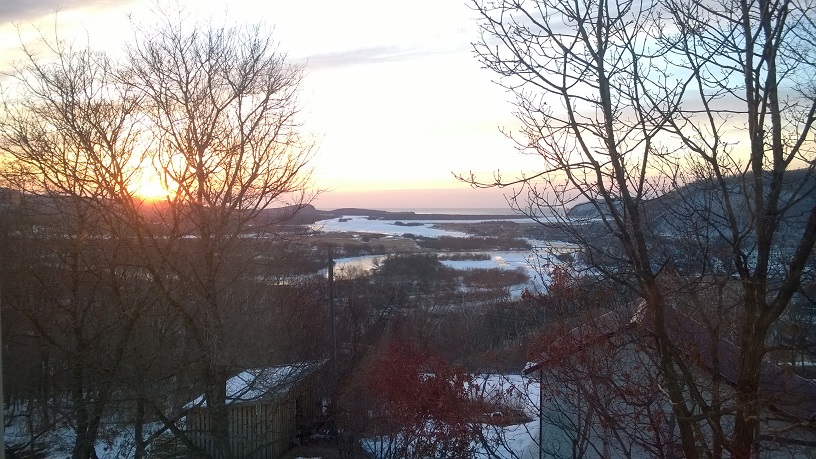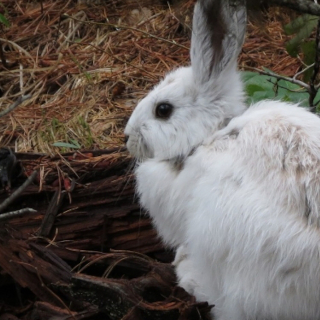Post-doc Dr. Eugenia Bragina returns from leading a workshop at WCS Russia

Post-doc Dr. Eugenia Bragina recently returned to her home country of Russia to teach a science writing workshop organized by the Wildlife Conservation Society (WCS) Russia office in the far eastern province Primorsky Krai. Below she recounts her teaching experience and time in this biodiversity hot spot, home to such rare species as Amur tigers and leopards, Kamchatka brown bears, and Blakiston’s fish owls.
Almost a year ago, I received an E-mail from Dr. Jonathan Slaght of WCS Russia saying that they were organizing a science writing workshop and were wondering whether I would be willing to teach it. I enthusiastically said yes. Several months later, I found myself at my desk in Raleigh surrounded by books on science writing, preparing lectures and exercises, thinking about the best way to convey my points – and trying not to panic. But time flew by, and at the beginning of March I left for Russia. Well, I left for Boston, then for Paris, then for Moscow, then for Vladivostok. From there, it was just an “easy” fifteen hour bus ride to Terney, where the WCS Russia office is located.
Wait, you don’t know where Terney is? Really? It is a settlement of 3700 people discovered by Westerners for the first time by French explorer Jean-François de Galaup, comte de Lapérouse , who named it after French naval officer Charles-Henri-Louis d’Arsac de Ternay. WCS Russia and Sikhote-Alin Nature Reserve are now based there, and both have been doing amazing research and conservation work related to Amur tiger, Amur leopard, Blakiston fish owl, musk deer and other unique species. An important part of their conservation efforts are workshops for the staff of nature reserves, institutions and NGOs in the far eastern parts of Russia. Having never led a week-long workshop before, I was going to be a part of these great efforts, and I was nervous.
I arrived on Saturday morning after the long bus ride, but soon left for an excursion to see the Blakiston fish owl. The biggest owl on the planet, this species is also very secretive, so not many people get to see them. They need ice-free creeks to fish and large old trees to nest which restrict them to small areas of suitable habitat. Jon showed us a beautiful female whose ear tufts were flapping in the wind. She seemed very focused sitting on her nest, and we left soon so we didn’t disturb the future mother too much.
On Monday the workshop started. We aimed to cover two main topics: writing grant proposals and scientific papers. Our audience was quite diverse. Twenty five people came from various regions in far eastern Russia: Lake Baikal, Magadan, Vladivostok, and elsewhere. Some of the participants were researchers, others worked in ecotourism, building environmentally-friendly cabins and working with local children. Among the ecologists, we had specialists on waders, Pallas cats, plants, spiders, and caddisflies, just to mention a few.
Every day started with a lecture given by Jon or myself. Then we worked with participants on their writing, either a manuscript for a journal or a grant application. Later, we conducted peer-reviews in small groups, editing and discussing one or two examples. After dinner, the group came together again to listen to short presentations by participants as everyone was curious to learn about each other’s work. The energy and dedication of participants was amazing. Very often, all one could hear in the room with 25 people was the sound of typing – everyone was focused on writing. During lunch and dinner breaks, some of participants often continued to write.
At the end of the workshop, many participants said that they did not know that writing could be so much fun and that the workshop had built their confidence. They also expressed their appreciation for the accessible lectures and the creative atmosphere.
On the last day, we asked people to state their writing goals for one and three months into the future. Now I am getting E-mails asking for help with drafts, and more questions on writing. People keep working and things are moving forward. Isn’t it what any teacher wants?

